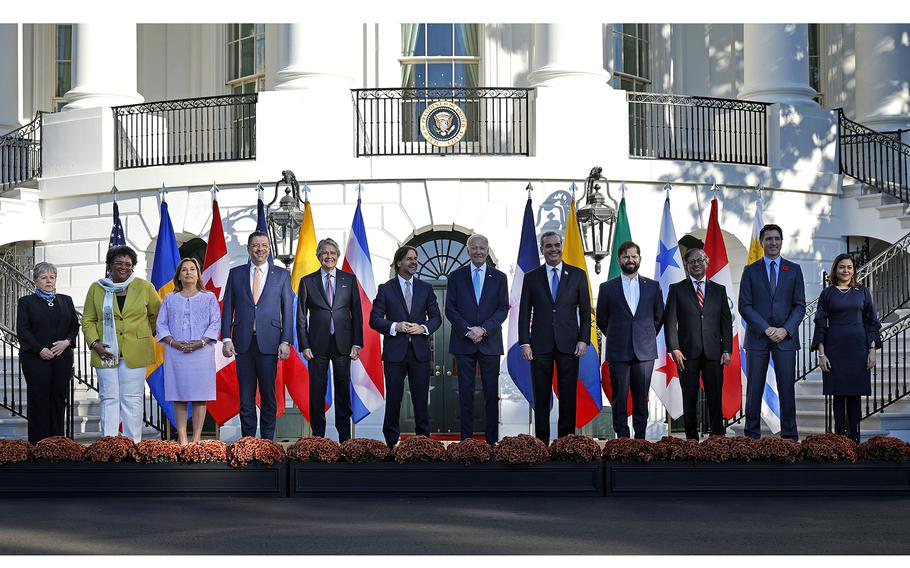
Left to right, Mexican Foreign Secretary Alicia Barcena, Barbadian President Sandra Mason, Peruvian President Dina Boluarte, Costa Rican President Rodrigo Chaves Robles, Ecuadoran President Guillermo Lasso, Uruguayan President Luis Lacalle Pou, U.S. President Joe Biden, Dominican President Luis Abinader, Chilean President Gabriel Boric, Colombian President Gustavo Francisco Petro, Canadian Prime Minister Justin Trudeau and Panamanian Foreign Minister Janaina Tewaney pose for a photograph with invited leaders during the inaugural Americas Partnership For Economic Prosperity Leaders' Summit on the South Lawn of the White House on Nov. 3, 2023, in Washington, D.C. (Chip Somodevilla/Getty Images/TNS)
(Tribune News Service) — Chile’s President Gabriel Boric asked President Joe Biden to remove Cuba from the list of countries that sponsor terrorism and praised the administration for recently lifting some oil sanctions on Venezuela during a meeting at the White House on Thursday.
Boric told reporters he asked Biden to lift sanctions on Cuba given “the difficult situation” that the Cuban people are going through.
Cuba is going through one of the worst economic crises in several decades, with shortages of food, medicines and oil plaguing the country. Government mismanagement, a botched currency reform and the leaders’ insistence on maintaining a planned socialist economy that has resulted in plummeting productivity are seen as significant drivers of the crisis. Economists also say U.S. sanctions play a part because they have cut the money flowing into the government’s coffers.
The island’s government has embarked on a diplomatic and media campaign to get Cuba removed from the U.S. list of countries that sponsor terrorism, a last-minute decision made by former President Donald Trump before leaving office. Cuban diplomats have made the appeal in interviews with U.S. media and to their counterparts in Latin America and the Caribbean. They said several banks have declined to open accounts and process financial transactions involving Cuba, hurting its economy.
“It is imperative to lift the sanctions on Cuba and remove Cuba from the list of state sponsors of terrorism,” Boric told reporters, speaking in Spanish.
He said he understood the Cuba issue ignites “strong emotions” in the United States. However, he added, “We must consider that these sanctions are not targeting just a government; they are affecting a whole population. When a people suffer, it should concern all of us.”
He said that he didn’t believe Cuba was sponsoring terrorism.
Boric and Biden also discussed events in Venezuela during their first bilateral meeting at the White House — they first met on the sidelines of the Ninth Summit of the Americas in June 2022 in Los Angeles. On Friday, Boric also attended the inaugural summit of the Americas Partnership for Economic Prosperity hosted by Biden.
According to a readout of the bilateral meeting sent by the White House, “the two leaders underscored the importance of the international community uniting in support of competitive and inclusive elections in Venezuela in 2024.”
“In that regard, I expressed my appreciation for the lifting of sanctions on Venezuela, particularly in matters related to energy investments and other areas,” Boric said. He mentioned that he expressed his commitment to continue working with other countries in the region to ensure that the elections in Venezuela next year “have all the necessary guarantees.”
His statements add to a growing debate over sanctions as a policy tool at a time when several countries in Latin America have moved to the left. Some leaders, such as Colombia’s Gustavo Petro or Brazil’s Luis Inácio Lula da Silva, have forged long-term relationships with the Nicolas Maduro regime in Venezuela and the Castro brothers in Cuba and usually abstain from criticizing those governments.
In that regard, Boric is an outlier because of his criticism of human rights violations in Cuba, Venezuela and Nicaragua.
President Andrés Manuel Lopez Obrador of Mexico has also become a vocal defender of Cuba and has offered to mediate to improve relations between the United States and the Caribbean island.
The Biden administration restored flights to some major Cuban cities and lifted caps on remittances in moves officials said were meant to help Cuban families. The administration also restarted a Cuban family reunification program and included Cubans in a new program allowing migrants to come to the United States with parole if they have a financial sponsor and pass background checks. Senior administration officials also told the Herald the administration was getting ready to make regulatory changes to support the private sector on the island.
At the same time, the administration has left in place some measures taken by Trump, including listing Cuba as a sponsor of terrorism.
On Thursday, 187 countries voted for a United Nations resolution calling to lift the U.S. embargo on Cuba, with only two voting against it — the United States and Israel — and one abstaining, Ukraine. A similar vote has occurred for several years with little impact on U.S. policies.
©2023 Miami Herald.
Visit at miamiherald.com
Distributed by Tribune Content Agency, LLC.